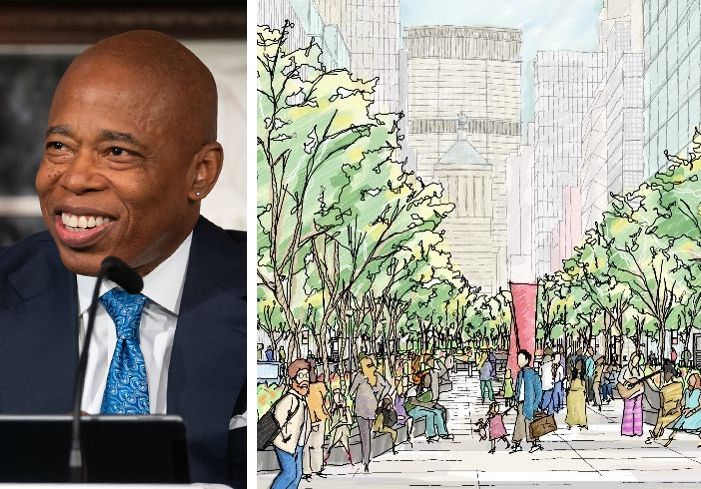NYC Seeking Bids to Restore Park Avenue’s Pedestrian Mall to Former Glory
By Abigail Nehring August 27, 2024 3:39 pm
reprints
New York City officials put out a call for designers to help bring back a lost pedestrian mall on a stretch of Park Avenue directly north of Grand Central Terminal.
The city’s Department of Transportation asked for bids of up to $1.5 million Tuesday to design a new linear park cutting through a stretch of Park Avenue in the heart of Midtown. The plan involves expanding the Park Avenue median and filling it with pastoral features, beginning at East 46th Street and stretching 11 blocks north past some of the city’s most famous office towers.
The project will return Park Avenue to its former glory, before city planners shaved its median to add a new traffic lane in 1927. The median’s restoration will add a new greenway — including a bike path — and will make the area safer for pedestrians by separating them from traffic, according to the mayor.
“High-quality public spaces aren’t just a luxury — they’re a necessity,” Mayor Eric Adams said in a statement Tuesday. “They’re a vital component of our vision to revitalize commercial corridors like Midtown and build a safer, more affordable, better city for all New Yorkers.”
The city has recently begun rethinking the fateful decision to cede part of the Park Avenue median to cars, with the idea of putting the “park” back in Park Avenue being in the works since 2019.
But the pandemic’s toll on central business districts moved it to the top of the mayor’s agenda, along with a similar redesign underway on Fifth Avenue, as part of the recovery plan Adams laid out in 2022 to usher in economic development and improve public space.
The Park Avenue corridor headed for a makeover includes some struggling office properties like RXR’s Helmsley Building — a candidate for a potential residential conversion — and others that are nearly fully leased, including L&L’s recently completed 425 Park Avenue. Some of the city’s tallest buildings are also on the strip, like J.P. Morgan Chase’s future 1,388-foot 270 Park Avenue and the 62-story office tower coming into being at 350 Park Avenue. RXR CEO and Chairman Scott Rechler was enthusiastic about the changes coming to the avenue, which abuts multiple RXR properties.
“The Park Avenue redesign is the kind of forward-thinking program that will not only benefit businesses large and small but — most importantly — the broader public,” Rechler said in a statement.
In fact, the Helmsley Building might not be the only Midtown office slated for conversion — with Adams looking to rezone a swath of the neighborhood to make it easier — so welcoming new residents is part of the mayor’s mission with the Park Avenue redesign.
“Investing in the redesigns of Park Avenue and Fifth Avenue continue to show progress in our commitment to improve the connectivity and feel of neighborhoods where we live, work, and play,” Ya-Ting Liu, the mayor’s appointee to the newly created position of chief public realm officer, said in a statement.
City officials will look for proposals that combine greenery, parklike amenities and a bike path, according to the mayor’s announcement.
All this will come after the Metropolitan Transportation Authority finishes its major overhaul of the subterranean train shed serving Grand Central Terminal that covers the same area. It will replace the facility’s leaking roof and fix other infrastructural problems.
The MTA recently got to work digging up the road at the corner of East 47th Street and Park Avenue, and expects to finish the project by next year, according to City Hall.
Meanwhile, the work above ground will be funded with revenue from the East Midtown Public Realm Improvement Fund Governing Group, a city planning task force that’s handling the transfer of development rights from several properties along the corridor, including 270 Park Avenue and 415 Madison Avenue.
Jamie Torres-Springer, head of construction at the MTA, said in a statement that the two projects are “a great example of collaboration across levels of government leading to a more efficient process and a better result for the public.”
City transit officials sent the request for proposals to “all eligible firms” and have not posted it publicly, according to a spokesperson for the agency. Design firms will have four weeks to respond, Crain’s New York Business reported.
Abigail Nehring can be reached at anehring@commercialobserver.com.



